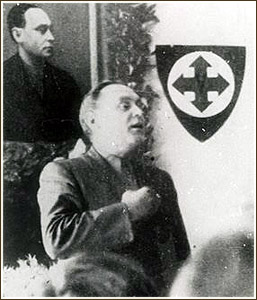- Ferenc Szálasi
Infobox Officeholder
name = Ferenc Szálasi
imagesize =
small
caption =
order = Leader of the Hungarian Nation
term_start = October 16, 1944
term_end = March 28, 1945
primeminister = Himself
predecessor =Miklós Horthy
(Regent)
successor = High National Council
order2 = Prime Minister of the Hungarian State
(de facto)
term_start2 = October 16, 1944
term_end2 = March 28, 1945
leader2 = Himself
predecessor2 =Géza Lakatos
(Regency)
successor2 =Béla Miklós
(Opposition, then officially)
birth_date = January 6, 1897
birth_place =Košice , thenAustro-Hungary , nowSlovakie
death_date = March 12, 1946 (aged 49)
death_place =Budapest ,Hungary
constituency =
party =Arrow Cross Party
spouse =
children =
profession =Soldier ,Politician
education =
religion =
footnotes =Ferenc Szálasi (IPA2|sa:laʃi fɛrɛnts) (6 January 1897 – 12 March 1946) was the leader of the
National Socialist Arrow Cross Party - Hungarist Movement, the "Leader of the Hungarian Nation" ("Nemzetvezető"), and the Prime Minister ofHungary for the final three months ofHungary 's participation inWorld War II . During his brief rule, Szálasi's men murdered 10-15,000 Jews. [Patai, Raphael, "The Jews of Hungary", Wayne State University Press, p. 590] After the war, he was executed for crimes against the state.Early life
Born the son of a soldier in
Kassa (nowKošice , Slovakia) of mixed Armenian, German, Hungarian (one grandparent), and Slovak andRusyn heritage.Szálasi followed in his father's footsteps and joined the army at a young age. He eventually became an officer and served in the
Austro-Hungarian Army duringWorld War I .In 1925, Szálasi entered the Hungarian General Staff and, by 1933, he had attained the rank of
Major . Around this time, Szálasi became fascinated with politics and often lectured on Hungary's political affairs. Szálasi was a fanatical right winger and a strong proponent ofHungarism , advocating the expansion of Hungary's territory back to the borders ofGreater Hungary as it was prior to theTreaty of Trianon , which in 1920 codified the reduction in the country's area by 72%.First steps in politics
In 1935, Szálasi left the army in order devote his full attention to politics, after which time he established the Party of National Will, a nationalistic group which was unpopular with the people.Fact|date=April 2007 It was eventually outlawed by the conservative government for being too radical. Unperturbed, Szálasi established the
Hungarian National Socialist Party in 1937, which was also banned. However, Szálasi was able to attract considerable support to his cause by adopting views that appealed to industrial workers and members of Hungary's lower classes.Fact|date=April 2007After
Germany 'sAnschluss withAustria in 1938, Szálasi's followers became more radical in their political activities, and Szálasi was arrested and imprisoned by the Hungarian Police. However, even while in prison Szálasi managed to remain a powerful political figure, and was proclaimed leader of the National SocialistArrow Cross Party (a coalition of several right-wing groups) when it was expanded in 1938. The party attracted a large number of followers and in the 1939 elections it gained 30 seats in the Hungarian Parliament, thus becoming one of the more powerful parties in Hungary. Freed due to a general amnesty resulting from the SecondVienna Award in 1940, Szálasi returned to politics. WhenWorld War II began, the Arrow Cross Party was officially banned by Prime MinisterPál Teleki , thus forcing Szálasi to operate in secret. During this time period, Szálasi gained the support and backing of the Germans, who had previously been opposed to Szálasi because his "Hungarist" nationalism place Hungarian territorial claims above those of Germany.Fact|date=March 2008Way to power
Following the Nazi occupation of Hungary in March 1944, the pro-German
Döme Sztójay was installed asPrime Minister of Hungary . The Arrow Cross Party was then legalized by the government, which allowed Szálasi to expand the party even further. When Sztójay was deposed in August, Szálasi once again became an enemy of the Hungarian government and RegentMiklós Horthy ordered his arrest. Szálasi, however, was protected by the Germans, who had grown tired of dealing with Horthy and planned to make Szálasi prime minister. Having knowledge of the Regent's effort to come to a separate peace with the Soviets and thus betray the Axis alliance, the Germans forced Horthy to resign in 1944. The Parliament then voted Szálasi asPrime Minister and Head of State; immediately after, Szálasi swore in front of the Crown of Saint Stephen as the "Leader of the Hungarian Nation" ("Nemzetvezető").In power
Under his rule as a close ally of Germany, the Germans continued the deportation of the Jews, which had been suspended by Horthy because of threats by the Allied powers, although Szálasi personally stood against it, because of the loss of manpower. He organised the so-called
International Ghetto . During that time some diplomats like Raoul Wallenberg gave protective passports to some Jews, which protected them from deportation. Germans argued they weren't valid according to international law, but Szálasi's government accepted them nevertheless. [http://www.nsz.prim.hu/cikk/486138/] His government promotedmartial law ,court-martials , executed those who were considered dangerous for the state and the continuation of the war. During Szálasi's rule, Hungarian tangible assets (cattle, machinery, wagons, industrial raw material etc.) were sent to Germany. He conscripted young and old into the remaining Hungarian Army and sent them into hopeless battles against the Red Army.Death
When the war ended, Szálasi was captured by American troops and returned to Hungary. He was tried by the People's Tribunal in Budapest in open sessions and sentenced to death for war crimes and high treason. Szálasi was executed in 1946 in
Budapest .References
*Fiala-Marschalkó: Vádló bitófák. London: Süli, 1958
ee also
*
Cluj Ghetto
*Hungarian Turanism
Wikimedia Foundation. 2010.
